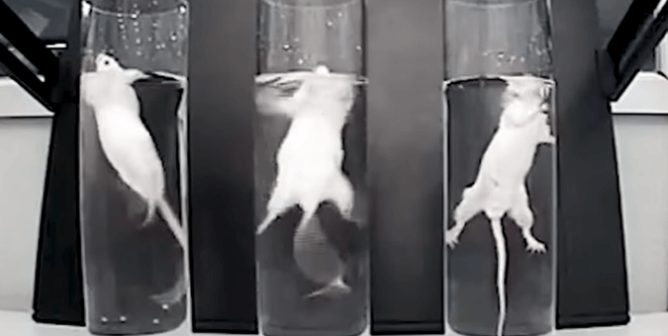Premarin: A Prescription for Cruelty
Every year, doctors prescribe hormone replacement therapy (HRT)—also referred to as menopausal hormone therapy—to hundreds of thousands of women experiencing menopausal symptoms. One of the HRT drugs that has historically been among the most widely prescribed is made from animal waste. The drug is Premarin, an estrogen-therapy drug currently manufactured by Pfizer (formerly Wyeth Pharmaceuticals), which also produces Prempro, an estrogen/progestin combination. Both drugs contain horse urine, specifically pregnant mare’s urine (PMU). Not only has this form of HRT proved to be dangerous to humans, horses raised for their urine are also kept confined and pregnant, and their foals often end up in the slaughterhouse.
Where Premarin Comes From
According to an industry report, 19 ranches in remote areas of Canada house approximately 1,300 pregnant mares who produce urine for Premarin and Prempro.1,2 For most of their 11-month pregnancies, these horses are confined to stalls so small that they cannot turn around or take more than a single step in any direction. The animals must wear rubber urine-collection bags at all times, which causes chafing and lesions, and their drinking water is limited so that their urine will yield more concentrated estrogen.3 Once the foals are born, the horses are impregnated again, and this cycle continues for about 12 years.4 PMU ranchers are expected to follow the “Recommended Code of Practice for the Care and Handling of Horses in PMU Operations,” but beyond the call for an “inspection program,” adherence to these guidelines is not tracked nor enforced.5
Some of the thousands of foals born on PMU farms each year are used to replace their exhausted mothers. Some are offered for adoption, but the remaining foals—along with worn-out mares—are sold at auction, where most are purchased by buyers for slaughterhouses.6
Risks Outweigh Any Benefits
In 2002, the Women’s Health Initiative (WHI), a study of more than 16,000 women using Prempro, was abruptly halted by the federal government after it concluded that HRT raises a woman’s risk of having a stroke by 41 percent, her risk of suffering a heart attack by 29 percent, and her risk of developing breast cancer by 26 percent.7 A follow-up study of the women a decade later found that, in addition to an increase in breast cancer rates, the cancer tended to be advanced and cause death.8 Further studies indicated that the type of HRT and dosage, the individual’s age and the length of treatment were all determining factors in the risk of developing breast cancer.9
The WHI also found that Prempro has no meaningful effects on women’s physical or emotional health, pain levels, memory, sleeping patterns, or energy levels. The researchers concluded that Prempro is effective for short-term relief of hot flashes but nothing else. Many women find that they can control hot flashes and other menopausal symptoms by making easy lifestyle changes—like eating a low-fat vegetarian diet and getting regular exercise—rather than contributing to animal suffering. Dr. Jennifer Hays from the Baylor College of Medicine commented, “The average woman will not experience an improvement in her quality of life by taking this pill.”10
What You Can Do
If your doctor prescribes HRT, discuss your options and ask for one of the many humane alternatives to Premarin. According to Katherine Swing, a board certified Obstetrician and Gynecologist and Diplomate of the American Board of Obesity Medicine, “(T)here is ample literature to support the safety, efficacy, and better side effect profiles of bio-identical hormones, such as estradiol, progesterone, and testosterone, over synthetic hormones, such as Premarin and Prempro.”11 Plant-based over-the-counter remedies are also available.
References
1Brenda Hunter, “PMU Ranchers Feel Pinch As Cuts Announced,” The Western Producer, 18 Apr. 2019.
2North American Equine Ranching Information Council, “About The Equine Ranching Industry,” 2019.
3Susan Donaldson James, “Adopt a Horse and Save It From the Slaughterhouse,” ABC News, 4 Jan. 2007.
4James.
5Manitoba Agriculture, Food, and Rural Initiatives, “Recommended Code of Practice for the Care and Handling of Horses on PMU Operations,” 2018.
6James.
7Charlene Laino, “Due to Risks, Hormone Trial Halted,” MSNBC, 9 Jul. 2002.
8Jonathan LaPook, “Hormone Replacement, Breast Cancer Link Grows,” CBS Evening News, 19 Oct. 2010.
9Jamie DePolo, “Using HRT (Hormone Replacement Therapy),,” BreastCancer.org, last accessed 28 Jan. 2024.
10CNN.com, “More Findings Against Long-Term Hormone Therapy,” 17 Mar. 2003.
11Mackie Shilstone, “Postmenopausal Women Need To Prevent Muscle Loss” NOLA.com, 20 Feb. 2019.







